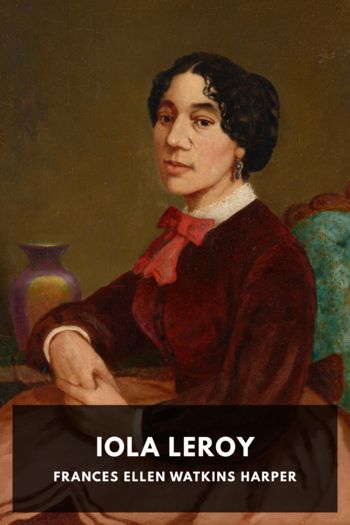Iola Leroy, Frances Ellen Watkins Harper [read aloud books .txt] 📗

- Author: Frances Ellen Watkins Harper
Book online «Iola Leroy, Frances Ellen Watkins Harper [read aloud books .txt] 📗». Author Frances Ellen Watkins Harper
“But, Iola,” said Robert, “you have tried, and been defeated. Why subject yourself to the same experience again?”
“Uncle Robert, I think that every woman should have some skill or art which would insure her at least a comfortable support. I believe there would be less unhappy marriages if labor were more honored among women.”
“Well, Iola,” said her mother, “what is your skill?”
“Nursing. I was very young when I went into the hospital, but I succeeded so well that the doctor said I must have been a born nurse. Now, I see by the papers, that a gentleman who has an invalid daughter wants someone who can be a nurse and companion for her, and I mean to apply for the situation. I do not think, if I do my part well in that position, that the blood in my veins will be any bar to my success.”
A troubled look stole over Marie’s face. She sighed faintly, but made no remonstrance. And so it was decided that Iola should apply for the situation.
Iola made application, and was readily accepted. Her patient was a frail girl of fifteen summers, who was ill with a low fever. Iola nursed her carefully, and soon had the satisfaction of seeing her restored to health. During her stay, Mr. Cloten, the father of the invalid, had learned some of the particulars of Iola’s Northern experience as a breadwinner, and he resolved to give her employment in his store when her services were no longer needed in the house. As soon as a vacancy occurred he gave Iola a place in his store.
The morning she entered on her work he called his employees together, and told them that Miss Iola had colored blood in her veins, but that he was going to employ her and give her a desk. If anyone objected to working with her, he or she could step to the cashier’s desk and receive what was due. Not a man remonstrated, not a woman demurred; and Iola at last found a place in the great army of breadwinners, which the traditions of her blood could not affect.
“How did you succeed?” asked Mrs. Cloten of her husband, when he returned to dinner.
“Admirably! ‘Everything is lovely and the goose hangs high.’ I gave my employees to understand that they could leave if they did not wish to work with Miss Leroy. Not one of them left, or showed any disposition to rebel.”
“I am very glad,” said Mrs. Cloten. “I am ashamed of the way she has been treated in our city, when seeking to do her share in the world’s work. I am glad that you were brave enough to face this cruel prejudice, and give her a situation.”
“Well, my dear, do not make me a hero for a single act. I am grateful for the care Miss Leroy gave our Daisy. Money can buy services, but it cannot purchase tender, loving sympathy. I was also determined to let my employees know that I, not they, commanded my business. So, do not crown me a hero until I have won a niche in the temple of fame. In dealing with Southern prejudice against the negro, we Northerners could do it with better grace if we divested ourselves of our own. We irritate the South by our criticisms, and, while I confess that there is much that is reprehensible in their treatment of colored people, yet if our Northern civilization is higher than theirs we should ‘criticise by creation.’ We should stamp ourselves on the South, and not let the South stamp itself on us. When we have learned to treat men according to the complexion of their souls, and not the color of their skins, we will have given our best contribution towards the solution of the negro problem.”
“I feel, my dear,” said Mrs. Cloten, “that what you have done is a right step in the right direction, and I hope that other merchants will do the same. We have numbers of business men, rich enough to afford themselves the luxury of a good conscience.”
XXV An Old Friend“Good morning, Miss Leroy,” said a cheery voice in tones of glad surprise, and, intercepting her path, Dr. Gresham stood before Iola, smiling, and reaching out his hand.
“Why, Dr. Gresham, is this you?” said Iola, lifting her eyes to that well-remembered face. “It has been several years since we met. How have you been all this time, and where?”
“I have been sick, and am just now recovering from malaria and nervous prostration. I am attending a medical convention in this city, and hope that I shall have the pleasure of seeing you again.”
Iola hesitated, and then replied: “I should be pleased to have you call.”
“It would give me great pleasure. Where shall I call?”
“My home is 1006 South Street, but I am only at home in the evenings.”
They walked together a short distance till they reached Mr. Cloten’s store; then, bidding the doctor good morning, Iola left him repeating to himself the words of his favorite poet:—
“Thou art too lovely and precious a gem
To be bound to their burdens and sullied by them.”
No one noticed the deep flush on Iola’s face as she entered the store, nor the subdued, quiet manner with which she applied herself to her tasks. She was living over again the past, with its tender, sad, and thrilling reminiscences.
In the evening Dr. Gresham called on Iola. She met him with a pleasant welcome. Dr. Gresham gazed upon her with unfeigned admiration, and thought that the years, instead of detracting from, had only intensified, her loveliness. He had thought her very beautiful in the hospital, in her gray dress and white collar, with her glorious wealth of hair drawn over her ears. But now, when he saw her with that hair artistically arranged, and her finely-proportioned form arrayed in a dark crimson dress, relieved by a shimmer of lace and a bow of





Comments (0)